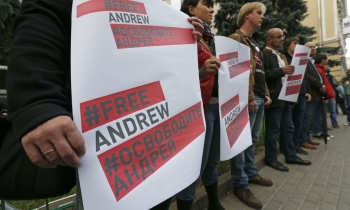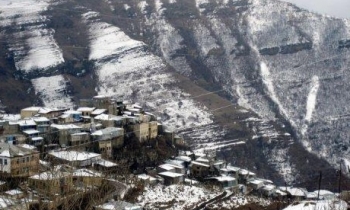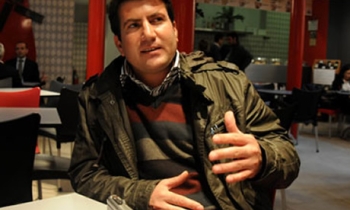Paris-based press freedom group Reporters sans Frontières (RSF) has collated an overview of the acts of violence against journalists and other media freedom violations that have taken place in the pasts few days in Northern Africa and the Middle East. The countries concerned are Libya, Algeria, three Gulf states (Bahrain, Saudi Arabia and Qatar), Yemen, Iraq (including Iraqi Kurdistan) and Syria.
LIBYA
Jean-Marie Lemaire, a French journalist working for the 24-hour TV news station France 24, suffered a gunshot wound to the calf on March 6 while covering clashes between rebels and pro-Gaddafi forces in Ben Jawad (less than 100 km east of Sirte). He is being treated in a hospital in Benghazi. A France 24 representative told RSF that two shots hit Lemaire’s camera and a third hit his calf. “The fibula was hit but the wound has been stabilized,” he said. “We are in the process of organizing his repatriation.”
The Gaddafi regime continues to block Internet access in Libya, violating the right to information and imposing a news blackout on its alleged atrocities against the civilian population.
The Internet has been disconnected since the evening of March 3 after suffering a great deal of disruption for several weeks. The leading Internet Service Provider presumably cooperated because its owner is none other than Mohamed Gaddafi, one of Muammar Gaddafi’s sons.
ALGERIA
Half an hour before the scheduled start of a demonstration called by the National Coordination for Change and Democracy (CNCD) in Oran (430 km west of Algiers) on March 5, the police arrested around 100 people including a dozen journalists, although they showed their press cards. They were taken to different police stations and then freed after about half an hour. The journalists concerned worked for Soir d’Algérie, Liberté, Le Quotidien d’Oran, El Watan, L’Expression, La Tribune and La Voix de l’Oranie.
The authorities also prevented a march from taking place the same day in Batna (425 km southeast of the capital). Several dozen protesters had gathered, shouting slogans demanding political change. Around 10 were briefly arrested and police confiscated Rachid Hamatou’s camera.
These violations of the right of assembly and media freedom occurred regardless of the government’s announcement on February 24 that the state of emergency introduced in 1992 was being lifted throughout the country except the capital.
BAHRAIN, SAUDI ARABIA AND QATAR
In Bahrain, the authorities have been using indirect censorship methods with foreign news media in order to keep live coverage of the demonstrations rocking the country since med-February to the minimum.
A France 24 journalist told RSF, “We arrived at 1 a.m. on 19 February. We were forced to spend the night at the airport and could not get out until the next afternoon. Our transmission equipment was confiscated. This was not the case with all the journalists. Some had no problems. We were lucky inasmuch as we were given a visa for two weeks. The next ones only got 72-hour visas. That was the case for the France 2 crew.
“On our arrival, we saw a BBC journalist being taken away and his equipment being confiscated. Despite the promises made by the authorities, our equipment was never returned to us. As we could not do live reports, we sent our reports via the Internet.”
Fearing the spread of the Tunisian and Egyptian revolutions, the authorities in Saudi Arabia and Qatar have blocked more websites.
In Saudi Arabia, the government agency in charge of communication and information, which is also the main Internet Service Provider, has blocked two new websites calling for political reform in Saudi Arabia – Dawlaty and Saudi Reform – which were created after the start of the protest movements in Tunisia and Egypt. The “Revolutionary Nostalgia” Facebook page, which includes calls for reform in Saudi Arabia, has also been blocked.
Dr Khalid Al-Majid, a law professor at Riyadh’s Imam University, was arrested on February 23 as a result of an article he wrote for the magazine Royaah titled “And if the Saudis said the people want to overthrow the regime?”.
In Qatar, blogger and human rights activist Sultan Khulaifi was arrested on March 1 and was taken to an unknown place of detention. RSF has been told he was arrested because of what he had written in his blog (http://binkhaleefa.blogspot.com) about human rights and democracy in Qatar.
IRAQ
The authorities on Monday banned live coverage of the demonstrations being held in Baghdad’s Liberation Square. Around 400 people gathered in the centre of Baghdad to protest against the lack of public services and demand the resignation the provincial assembly’s president and members.
Two journalists employed by the newspaper Al-Sabah, Ahmed Abdel Hossein and Ali Al-Sumeri, were arrested as they were returning to the newspaper after the demonstration. They were released an hour later after being threatened and insulted. These incidents took place although the Journalistic Freedoms Observatory had obtained an undertaking from the Baghdad military command on March 1 that the TV stations would be allowed to come to demonstrations with their satellite uplink trucks.
Many journalists were physically attacked by the police on March 4 in Basra, 495 km south of Baghdad, while covering a demonstration by about 300 people who had gathered outside the provincial government’s headquarters in Abdel Karim Qassem Square to protest against cuts in the local water and power supply. Despite government undertakings to respect the media’s work, several of the journalists were injured by the electroshock batons used by anti-riot police to disperse the protesters.
A local newspaper, Sumariya News, named five journalists who were the victims of physical or verbal violence by the police while covering the demonstration: Associated Press photographer Nabil Al-Jourani, Al-Alam TV cameraman Mohamed Al-Rased, Al Mustaqbal reporter Muntazer Al-Amer, Baghdad News Agency reporter Shehab Ahmed, and Haydar Al-Mansouri, the head of the local branch of the Union of Journalists.
Mansouri, who interceded in an attempt to defuse the tension, told Sumariya News that three of the journalists were taken to Al-Sadr Hospital: Jourani, who lost consciousness for while, Ahmed, who suffered concussion, and Rased, who suffered a head injury. One of Amer’s arms was also broken.
Accusing the anti-riot police of deliberately attacking the journalists, Mansouri said he feared the incident would have a very negative impact on media freedom in the province. Questioned by Sumariya News, Basra police chief Hassan Ali Mali acknowledged that his men were ordered to attack journalists during the demonstration but insisted that it was not “premeditated.”
Basra’s journalists reacted by announcing their refusal to cover any police activities until those responsible for the violence are punished. They called for the creation of a mixed commission of enquiry – consisting of members of the army, police, local government and journalists’ organizations – and threatened to stage a sit-in if their demands were not met quickly.
Many journalists were the victims of violence during the “Day of Rage” demonstrations in Baghdad and other cities on February 25.
IRAQI KURDISTAN
The premises of radio Dang (Voice) in Kalar, a town 160 km south of Sulaymaniyah, were ransacked and badly damaged by soldiers at dawn on March 6. The station had received threats, owner Jaza Muhammad told Reporters Without Borders.
“But we thought these threats were just designed to silence us, so that we would not refer to the situation in the Kurdistan autonomous region and to the demonstrations in Sulaymaniyah and Kalar,” Muhammad said. “We never imagined that we could be the victims of so much violence. The equipment was either seized or vandalised.”
Muhammad added: “Our premises are located right next door to the police station and the office of the Asayesh [intelligence services], so we never thought of giving the station more protection. We had just one security guard, who was kidnapped while the gunmen were demolishing everything inside.” Created in 2009, Dang was Kalar’s only independent radio station. The owner has filed a complaint and the town’s mayor has demanded an investigation.
The attack on Dang was preceded by a criminal raid on Naliya Radio and Television (NRT), a satellite TV station, on February 20 in Sulaymaniyah and an arson attack on the building that houses KNN, another TV station, on February 17 in Erbil.
Shaswar Mama, an NRT reporter in Raniya, received death threats on March 6. “Someone called me on my mobile phone and told me to stop covering the demonstrations or else I would have to start being scared of my own shadow,” he told RSF.
Demonstrators used violence yesterday to prevent Kurdsat TV journalists from filming a protest in Sulaymaniyah’s Freedom Square, accusing the station of biased coverage of their demonstrations. Kurdsat is operated by the Patriotic Union of Kurdistan (PUK), one of the two parties that control the Kurdistan Regional Government.
YEMEN
Salah Al-Mansoub, a reporter for the Al-Wahdawi Net website, was attacked by unidentified assailants while taking photos of a demonstration in support of President Ali Abdullah Saleh in the town of Ad-Dali on Monday.
Men armed with traditional Jambiya swords attacked Saber Al-Jabri, a reporter for the Saudi TV news station Al-Akhbariya Al-Saudiya, and his cameraman, Kamal Al-Samadi, on March 6 in Sana'a as they were preparing a news report on the latest developments in Yemen. Passers-by came to the aid.
Adel Omar, a reporter for Al-Wahdawi Net and Marebpress, was injured by a stone thrown by government supporters when they invaded Al-Hurriya Square in Ibb, south of the capital, on Monday. His video camera was also seized. RSF was told that police were present but did not intervene.
Yemen Online, a news website with reports in English and Arabic, was the target of a cyber-attack on Monday in which unidentified hackers managed to change photos and text. Administrators said they wanted to move the site to servers abroad for better security. Owner Jamal Al-Awadhi said he had received several calls from ruling party members criticising the site’s coverage of the current situation in Yemen.
Mohammed Al-Jaradi, a reporter for the independent newspaper Al-Ahali, was attacked by government supporters in Change Square in Sana'a on March 4. He was insulted and one of his hands was broken.
The house of Nasser Abdullah Aldibibi, the editor of the newspaper Al-Hurra, was ransacked and torched on March 2. Aldibibi had been getting many threats since publishing an issue on February 23 with the front-page headline: “Go!”
The authorities have been preventing the circulation of several newspapers in the southern city of Aden. Issues of Hadith Al-Madina, Al-Diyar, Al-Masdar and Al-Thaury have been seized despite attempts by the Union of Journalists to negotiate with the provincial security department.
Al-Masdar Online, a very popular website in Yemen, is still inaccessible. Government officials have not explained why it cannot be accessed. Yemen’s sole Internet service provider, YemenNet Communications, has denied any responsibility.
SYRIA
The trial of Kurdish blogger Kamal Hussein Sheikhou, a student at Damascus University’s faculty of literature, began on Monday. Sheikhou, 32, was arrested at the border on June 23, 2010 as he tried to enter Lebanon using his brother’s passport.
The author of many articles on the All4syria website, Sheikhou is charged with “publishing information defaming the nation.” He began a hunger strike on February 16 in protest against conditions in Adra prison. Several Syrian human rights groups have reported that his health has deteriorated a great deal and that he had to be hospitalised for several days. The court adjourned the trial until March 14.
The government news agency SANA reported on Monday that President Bashar al-Assad had pardoned 200 prisoners held for minor crimes as well as some elderly and ill detainees. The amnesty, which does not concern political prisoners, was announced on the eve of the anniversary of the start of Baath Party rule in Syria.
Thirteen imprisoned human rights activists, including the lawyers Haytham Maleh and Anwar Bunni, meanwhile announced on Monday that they had begun a hunger strike to demand the end of “oppression” in Syria.
RSF has meanwhile learnt of the death of Kareem Arbaji, a blogger who was arrested by military intelligence in July 2007 for helping to run the online forum Akhawia and was sentenced to three years in jail by a state security court in Damascus in September 2009 on a charge of “publishing mendacious information liable to weaken the nation’s morale.”
He was freed in January 2010, after representatives of the Christian church in Syria addressed a request to the president’s office for his early release on the grounds that his father was in very poor health. The authorities had been harassing him again for some time and he suffered a stroke on March 5 while in Lebanon. He was 31.
JORDAN
Around 600 journalists demonstrated in Amman on Monday to demand “independent and free” news media and to express their opposition to any form of government censorship. “Direct and indirect government intervention in the press have killed journalists’ dreams of having free media to report the truth," the demonstrators said in a statement, AFP reported.









